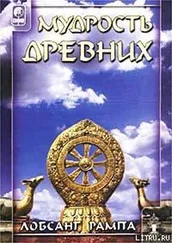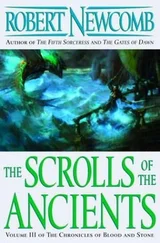“The Captain will bear down hard on me if I don’t, master. She does love crayfish fried in a bit of salt butter, and it will stop her fretting about the hurt done to the ship.”
The cook was a large, hairless man with pinkish-gray skin and a round, dolorous face. His name was Tibor. He wore only ragged trousers belted with a length of frayed rope, and chain-smoked cigarettes he rolled from scraps of paper and strands of coarse black tobacco he kept in a plastic pouch. He absentmindedly snapped at passing insects, and when he spoke he passed his long red tongue over his black lips at the end of every sentence, as if relishing the taste of his words.
Yama, who had learned the trick as a child, helped Tibor weave crayfish traps from strips of reed. The traps were simple things, little baskets of close-woven reed stems with spines at the mouth which pointed inward; when the crayfish entered, they could not back through the spines to get out. Tibor’s big hands, each with his long fingers set around a sensitive pad, worked quickly and deftly, making two traps for every one of Yama’s. The cook baited the traps with scraps of smelly fat, and tied them at intervals along the margin of the stream.
They soon fell to talking. The cook was from a bloodline which had been enslaved for hundreds of generations; his distant ancestors had fought on the side of the fallen machines in the Age of Insurrection. Having sinned against the Preservers, they were now their slaves, and so the slaves of all free men on Confluence. Most were hierodules, but Tibor had been sold on the open market after the shrine of his temple had failed at the beginning of the war against the heretics. Tibor was not bitter about his fate, even when he explained that the long vertical scars on his chest marked where his nipples had been seared away. “It is so I cannot feed children, which is what the men of my people do. Our owners do not like us to keep families; our babies are taken at birth and fed on an artificial milk. If they fed from me, they could feed only from me and no other, and I would have to feed them for three years. No owner would want that! You do not believe me, because in most peoples it is the women who care for babies, but it is true. So instead of my babies I feed all of you!”
Tibor laughed loudly at this joke. Despite his down-turned mouth and downwardly slanting eyes, he was by nature a cheerful man, “I am not smart,” he said, “but that is good for me, because a smart slave is always unhappy.”
Yama thought of the librarian of the peel-house. Zakiel had been born a free man; unlike Tibor, he had known another life. And yet he was happy, for although he possessed nothing, not even his own life, he still had the work he loved. Yama had not thought about this before, and asked the cook many questions. They talked together until Tibor said that they had enough traps to feed the whole ship for two days if only half caught anything, adding that for a little while Yama had been the servant, and he the master.
“Some say you are the slave of all of the peoples of Confluence,” Tibor said. Yama asked him to explain, but he only laughed and changed the subject. “This is a bad land, the sailors say. They do not stray far from the ship because of it. They told me I was a fool to come with you, but they’ll be glad of fresh food.”
Pandaras had fallen asleep in the sun, and woke to find that leeches were feeding on his ankles, which he had dangled in the stream to keep cool. Tibor burned off the leeches with the glowing coal of a cigarette, and Pandaras fussed at the blood that streamed down his ankles from the little round punctures, and complained that he had soaked his second-best pair of trousers and would never get them back into shape, and only shut up when Tamora pointed out that if he wanted to go back now he would have to go back alone.
It did not take long to walk to the base of the tower.
The low cliffs were easy to climb, for their black, pebbly clay was deeply gullied by erosion. Beyond was a plain less than a league wide but of seemingly infinite length, thin red laterite and dry grasses punctuated by stands of saw-toothed yucca and palmetto, and sprawling clumps of gumbo-limbo. There were many outcrops of keelrock, smooth spurs or folded layers just as they had been cast a hundred thousand years before. Not even lichens had gained a hold on the slick keelrock, and all across the narrow plain a thousand facets shone and winked in the strong sunlight.
The tower seemed to be fused into the keelrock ridge at the edge of the world, or perhaps it had been grown from it by an art that had been lost since the Preservers had seeded Confluence with the ten thousand races of the Shaped. The tower was smooth and round, and several hundred chains high. Its black surface was slickly reflective and like the keelrock quite unscarred by time. Tumbled remains of wooden scaffolding and bent hoops which had once been the frames of tents were scattered around it. Ravens rose into the air as the party approached, calling loudly to each other in hoarse, indignant voices before circling away into the vast volumes of air.
Beyond the tower, the edge of the world dropped vertically into clouds that seemed to stretch away forever, as if the world swam not in the void but in a sea of absolute whiteness. Chains of islands floated above their own shadows, lying at different levels in the clear air above the clouds. Hundreds of islands, thousands. Yama marveled at their number.
The shadow of the black tower lay on the white cloud deck like a road, and sunlight broke in splintered rainbows around its top. Beside it, the shadows of the five people were like giants aping their every movement, and around the head of each was a circular rainbow. Yama moved his arms and grinned when his shadow gestured back across leagues of cloud. Pandaras and the cook danced and capered there at the edge of the world, and even Tamora, who had been nervously alert since leaving the ship, smiled at the sight.
“It is a rare wonder,” Eliphas said proudly, as if he had led them here just to see this. “A blessing of the Preservers.”
Tamora turned and squinted into the level sunlight at their backs. “Grah. I’d say it is a matter of the angle of light and properties of the clouds.” She would not agree with Eliphas about anything, but she added grudgingly, “It is some kind of wonder, I suppose.”
“It is beautiful,” Pandaras said. “It is a miracle of light and air and mist. I will make a song of it.”
“Out of my hearing, I hope,” Tamora said. “Yama, as soon as we are rested, we should turn back.”
Eliphas said to Yama, “The blessings of the Preservers will be upon you, doubled and redoubled, when you visit the shrine, brother. We will leave the others to rest here, and go down together.”
Yama said, “Where is the shrine?”
Eliphas smiled, and pointed straight down.
Chapter Thirty
The Edge of the World
A stair, entered by a narrow defile between two tall, roughly man-shaped outcrops that Eliphas called the Watchers of the Void, led down the vertical rock face at the edge of the world. It was broad enough for a decad of men to have descended abreast, but its steps, carved from naked keelrock, were steep and narrow and slippery. Yama discovered that he was terrified of falling, imagining himself plummeting through the cloud deck and continuing to fall until at last passing beyond the envelope of the world’s atmosphere and perishing, as Angel had perished in the embrace of a copy of her own self. Were their bodies still falling through the void beyond the world? He and Tamora clung to the carved face of the cliff as they followed Eliphas, finding comfort in the faces and bodies of the men and women and creatures that flowed under their fingertips.
Читать дальше












